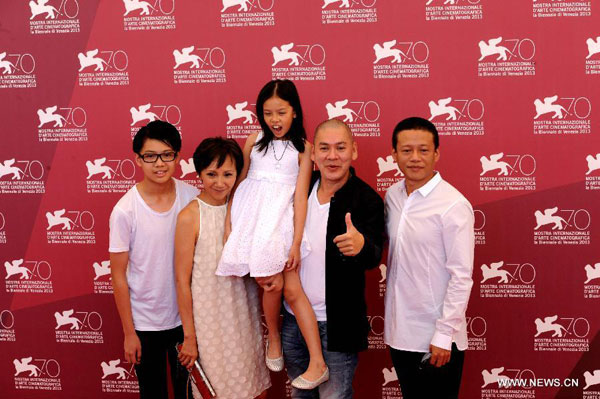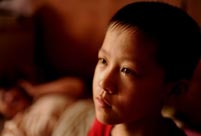 |
| China's Taiwan director Tsai Ming-liang (2nd R), actor Lee Kang-sheng (1st R), actress Lu Yi-ching (2nd L) pose at the photocall of the screening of "Stray dogs" during the 70th Venice Film Festival, in Lido of Venice, Italy, on Sept. 5, 2013. (Xinhua/Xu Nizhi) |
Flows of emotions from the slow gestures of the dignified, sorrowful protagonist of "Jiaoyou" (Stray Dogs) directed by Tsai Ming-liang is something that many would not expect to experience in the frenetic film world of today.
"I am speechless. The protagonist's face was simply enchanting, able to silently tell all this desperation and abandon," a cinema critic, Nalita Zeppilli, told Xinhua on Thursday shortly after the world premiere was screened at the Venice film festival, which runs from Aug. 28 to Sept. 7 in the Italian water town.
The competition film by the Taiwan-based director portrays the everyday life of Hsiao Kang (played by Taiwanese actor Lee Kang-sheng,) a disgraced man who holds signboards for a living in Taipei's streets that are ever flowing with vehicles and pedestrians. The only people in his life are his two children.
The single-parent family moves from one abandoned building to another. The father and two children eat together, brush their teeth together and sleep together. They have no electricity and rest on the same mattress with a head of cabbage, tightly embracing each other.
On the day of the father's birthday, the family is unexpectedly joined by a woman who might be the key to unlock the buried feelings that linger from the past.
For many among the public, "Jiaoyou" was not the first encounter with Tsai, whose film "Vive l'Amour" was honored with the Golden Lion award at the Venice festival in 1994, establishing a place for him in the world of international cinema. Each of his feature films has since been selected by either the Cannes, Berlin or Venice film festivals.
The embodiment of Kang's melancholy lies in some slow framings, or almost paintings, that last for several minutes. "Thought it takes a certain dose of patience to get to the end, I liked it very much. Actually I think that this is one of Tsai's best movies," another film expert of a popular Italian newspaper, Andrea Chimento, said.
Tsai told a press conference that if it were not for Kang, he probably would not have made this movie. The two have worked together for 20 years and the director said that he wanted to film how has this face has changed under the camera or has revealed over all this time.
"It is because framings are slow that we can watch deeply inside them, slowness is very beautiful, and it is as beautiful as old age," he highlighted.
The director also told Xinhua that he does not feel the need to make the kind of films that expect the patronage of cinema audiences and he is satisfied with the 10 movies he has made in his life.
He said he always aimed at a "different cinema," or a true one, to reject the mechanisms of the entertainment market, which constantly panders to popular taste and is often driven by frenetic rhythms.
"Jiaoyou" might be his last movie, Tsai added, though he does not know what are "the destiny's plans" for him. "Jiaoyou" took him three years to make, from scripting to editing, and he was constantly cutting away plots, structure, narrative and even characters in the process. However, all that remained was Kang's face, the 55-year-old director pointed out.
In one of the shots, he gave Kang a head of cabbage and asked to eat it in front of the camera, without giving him any instructions. Then he watched him chew, bit, chomp and devour the cabbage with pity and regret, satisfaction and sourness, and mixed feelings of love and hate.
"I watched him consume that head of cabbage with 20 years of his life. He cried, and I cried too. We have worked together from 1991 to 2012, and all I can say is that his face is my cinema," he said.
 Mountain of garbage in Nairobi
Mountain of garbage in Nairobi Highlights of MAKS 2013 Int'l Aviation and Space Show
Highlights of MAKS 2013 Int'l Aviation and Space Show  10th China-ASEAN Expo opens in Nanning
10th China-ASEAN Expo opens in Nanning Eagle Boy takes to sky to break another record
Eagle Boy takes to sky to break another record 12-year-old boy becomes pillar of the family
12-year-old boy becomes pillar of the family Police name attacker who took boy's eyes
Police name attacker who took boy's eyes Top 10 naked hotels in the world
Top 10 naked hotels in the world The most gorgeous Chinese women in the eyes of foreigners
The most gorgeous Chinese women in the eyes of foreigners A collection of bizarre rooftop buildings around China
A collection of bizarre rooftop buildings around China Putin intimate contacts with marine animals
Putin intimate contacts with marine animals China's frigate 'Bengbu'in fire training
China's frigate 'Bengbu'in fire training Fresh students 'forced' to register in university independently
Fresh students 'forced' to register in university independently 2013 Taiwan Int'l Tourism Expo kicks off in Taipei
2013 Taiwan Int'l Tourism Expo kicks off in Taipei Photo story: Take a gap year
Photo story: Take a gap year Nokia's Global Headquarters: visiting a declining empire
Nokia's Global Headquarters: visiting a declining empireDay|Week|Month